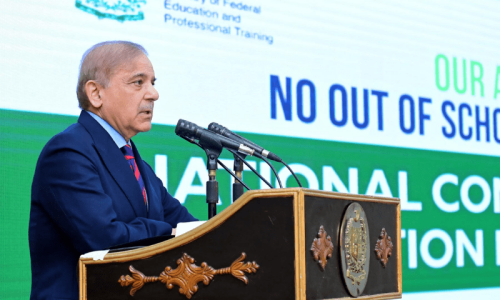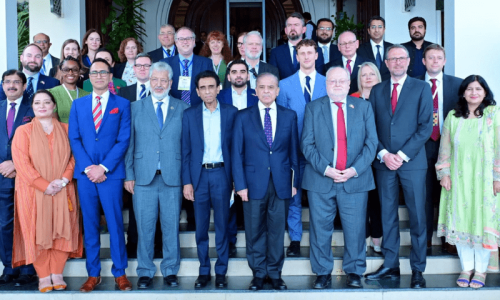IN a promising albeit familiar declaration, the prime minister has announced a four-year “education emergency” to eradicate the blight of illiteracy and bring millions of out-of-school children into the classroom fold. While many governments have come and gone and such emergencies have been declared, obstacles to access, quality and equity in education persist, underscoring the need for a renewed commitment. The PM’s stated resolve to personally oversee this initiative and to collaborate across provincial and political lines enhances hope but also raises the stakes for tangible outcomes.
Pakistan’s education crisis is both deep-rooted and widespread. The statistics are sobering: the country grapples with a literacy rate of only 62pc and educational spending at a mere 1.7pc of its GDP. There are an estimated 26m children out of school and 70pc of 10-year-olds are unable to comprehend basic texts. Add to this the fact that a significant proportion of schools lack basic facilities such as potable water and toilets.
The disparity in educational access between urban and rural areas, and between boys and girls, further complicates matters. The authorities must prepare a solid plan of action if they truly aim to tackle this beast. First, increasing the allocation of GDP to education by the provinces and the centre is non-negotiable. This increase must be used judiciously to improve school infrastructure and ensure all children have access to basic educational facilities. Furthermore, teacher recruitment, training, and retention strategies must be overhauled to address the gap of 200,000 vacant teaching positions nationwide, as highlighted by Malala Yousafzai.
Additionally, the authorities should implement targeted interventions to bring out-of-school children, especially girls, into the educational system. Initiatives like the school meal programmes, as suggested by the World Food Programme, can be effective in increasing school attendance, while addressing nutritional deficiencies that affect learning.
The curriculum needs to be revamped to focus on foundational literacy and numeracy. Integrating technology can help bridge the gap between different regions and provide remote learning opportunities. Moreover, collaborative efforts with international partners and NGOs should be harnessed to bring best practices and funding to the fore. International organisations are poised to support, but they require a dispensation that is transparent and committed in its approach.
Lastly, the commitment to establish the ‘Pakistan Skill Company’ and the ‘Pakistan Skill Development Fund’ is a step in the right direction. It acknowledges the broader spectrum of education beyond primary schooling, which is crucial for economic independence and growth.
With a strategic, well-funded, and inclusive approach, it is possible to transform the educational landscape of Pakistan. It is hoped that the education authorities deliver an actionable plan that will stand the test of time and political change. For once, let this not be a missed opportunity.
Published in Dawn, May 10th, 2024















































Dear visitor, the comments section is undergoing an overhaul and will return soon.